-
王辉耀:“一带一路”是推动新型全球化“强心剂”
央广网北京4月28日消息 据经济之声《央广财经评论》报道,“一带一路”倡议提出三年多来,沿线国家之间在政策沟通、设施联通、贸易畅通、资金融通和民心相通等方面取得了很多重大进展和成果,推进了沿线各国经济发展战略对接和政策协调,启动或完成了一些连接亚洲各次区域以及欧亚大陆的重大基础设施建设项目,有力促进了要素和资源在区域和全球范围内的自由流动和有效配置。 “一带一路”倡议是中国提供给世界共同发展的公共产品,在当前世界逆全球化思潮涌动的背景下,真正的解决之道是寻找一条惠及更多人群、利益更加平衡的道路,从而实现更高程度的全球化。事实证明,一带一路在这个过程中必将发挥重要的推动作用。 国务院参事、中国与全球化智库(CCG)理事长王辉耀今日做客《央广财经评论》特别节目《“一带一路”智库说》指出,“一带一路”是推动新型全球化的“强心剂”。 王辉耀表示,中国现在已进入全球化2.0的时代。实际上在二战以后就有了全球化的1.0的版本。所谓全球化1.0版本,是指二战以后世界上建立联合国,建立了世界银行,建立了WTO,也建立了国际货币基金组织。建立这些国际组织,对于世界经济的维护和发展,都起到了巨大的作用。 中国在上世纪80年代开始全面改革开放,到2001年中国加入WTO,中国全球化的参与达到新的高度,也开始成为全球化的受益者。加入WTO这十六年里,中国GDP和国际贸易增长了8倍。 但是去年,我们看到了反全球化的倾向,面临逆全球化的趋势。在这个时候,全球化面临提升和再发展的阶段,全球化的2.0的版本由此呼之欲出。中国在三年前提出“一带一路”倡议,我们也建立了亚投行。在2.0版本的全球化过程中,中国发挥着更多的作用。中国现在在全球经济增长贡献率上,已经排到第一,达到了30%。我们说全球化的2.0版本,不是说我们要否定1.0版,也不是说我们要推翻、重建现有全球化的机制和全球治理机制,我们实际上是在现有的基础上进行完善、改进、提升、加强和巩固。 具体到企业和人员交往层面,王辉耀举例说,中国在过去几年的对外投资已经超过了来华投资,我们货物流动已经成为全球第一,我们资本流动也发展得非常快。人才流动方面,我们每年有60多万留学生出去,每年有1.2亿人次的出境游旅。也就是说,中国货物流、资本流和人群流,都开始全方位加入到新型全球化进程当中。这种新型的全球化,已经深入到我们的生活方方面面。 王辉耀认为,中国“一带一路”倡议,是新一轮全球化的强心剂和全球经济的新增长点,有着巨大的历史意义和现实意义。“一带一路”是一个全世界共同参与的事业,它为全球化带来新活力,也为克服全球化过程当中的一些弊病或者副作用探索更多的经验。文章选自央广网,2017年4月28日
2017年5月2日 -
李成:特朗普是特殊时期的特殊总统
李成,中国与全球化智库(CCG)学术委员会专家,美国布鲁金斯学会约翰·桑顿中国中心主任。 美国布鲁金斯学会约翰·桑顿中国中心主任李成26日下午做客深圳创新发展研究院主办的“智库报告厅”,与深圳的专家学者和普通民众畅谈了世人眼中特立独行的特朗普总统。 李成认为,如果仔细了解特朗普作为一个商人的行为模式,就会看到他为什么在选举以后的一段时间当中对中国的强硬。在《交易的艺术》一书中,特朗普讲到这样三点:首先你必须在谈判的时候把对方最在乎的东西亮出来,而又先前不在谈判桌上的内容放到谈判桌上来谈。第二开始谈判的时候你的出价要近乎荒谬般的高,而且你逐渐下来,你永远不会输的,你是处在一个非常好的地域,对方还觉得你已经妥协了,实际上你早就处于不败之地的谈判手段。第三,所有的议题应该是相联系、相关的,不要一个是经济、一个是政治、一个是安全,所有的东西要放在一起,这样可以扩展你最后讨价还价的余地,使你能够赢得主动。 “特朗普也许是一个多变的人,但他不是一个复杂的人,实际上挺简单的,你仔细看他没什么秘密,他就是这个思路。”李成说,他强调跟中国的关系其实是不突然变化的,而是早在理念当中。他有很多的东西希望中国跟他配合,以前在一定理念上进,他对中国人的想法可能比前任几届的总统更了解,他对中国人来讲是全方位思考,他也是全方位在思考,把很多似乎没有关联的东西都连在一起。在这样的一个程度上,作为一个商人,也许特朗普跟前几届总统不一样。 李成说,特朗普的执政特点确实有扑朔迷离的方面,他确实把这些东西都当成交易,犹太大商人索罗斯说他没有什么原则性,但是太大的原则性也解决不了问题,会变得非常意识形态。特朗普是以美国为中心的实用主义,或者说是机会主义、民族主义。他对意识形态输出不感兴趣,他大胆选用金融商业的领袖、退休将军,包括有争议的人,包括班农。谈判时候的蛮横、极度地要价,他不在乎形式,像基辛格说的那样,他着重于结果。非常重视大国关系,雄心勃勃,渴望有所建树,并且青史留名。 李成认为,“特朗普要么成为美国最伟大的总统之一,要么可能会失败得非常凄惨,但就是不会介于两者之间”。他必须要做很多的事情来改变这个状况,也许这是美国的最后一个机会,但是由于他的价值观念的理念,他失败的可能很大,因为从总体来讲,他是特殊时期的特殊总统,但是有很多东西他讲到了,他反其道而行之到底能够走多久、走多远,都是一个我们无法知道的事情。 最后,李成引用了卡特时期的美国前国家安全顾问布热津斯基讲的一句话“发展速度的明显加快及发展轨道的不确定性是我们正在经历的历史特点”。文章选自光明网,2017年第4月27日
2017年5月2日 -
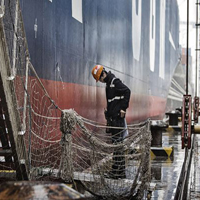
【Bloomberg】India May Water Down China-Championed Asia Trade Pact
India’s foot dragging on a China-championedAsia trade pact has increased the risk the deal gets diluted or delayed. A fear of being flooded by Chinese importsand an insistence on global mobility for its IT services workers is behindIndia reluctance to move forward. While Asia’s third-largest economy mayeventually sign on to the Regional Comprehensive Economic Partnership, analystssay the end product could be so vague it has little benefit. "I just don’t see an appetite in Indiafor trade," said Richard Rossow, the Wadhwani chair in U.S.-India policystudies at the Center for Strategic and International Studies in Washington. "Ifthey can water it down to have something almost meaningless, they would signit. But if other people hold their ground, I don’t see them signing it." With President Donald Trump withdrawing theU.S. from a separate 12-nation deal known as the Trans-Pacific Partnership,attention has turned to the RCEP, which involves 16 Asian nations accountingfor 3.5 billion people and $22.5 trillion in gross domestic product. While theTPP would be a broader and deeper pact, the RCEP in theory could boost growth, especiallyamong the disparate economies of Asia. China as well as RCEP’s chief negotiatorhave indicated the bulk of the deal could be wrapped up this year. But there’sno real solution to India’s resistance to lowering tariffs for China as well asDelhi’s penchant for caution on trade deals. Some analysts have suggestedcountries could even sign an agreement without India. The next round of talks is scheduled forthe Philippines in May, after which negotiations move to India. Commerce Minister Nirmala Sitharaman hassaid India is committed to the RCEP, as has the country’s foreign ministry. Butthere is quiet grumbling over India’s stance. Rossow has spoken to officialsfrom one RCEP nation who expressed deep frustration over India’s position andasked for advice on how to handle New Delhi. One senior negotiator involved in the talkssaid tensions between China and India, which lack a bilateral free-tradeagreement, are a big sticking point. There are also disputes between India andSoutheast Asian nations, which are reluctant to entertain migration provisionsfor service sector workers. India has been hesitant to expose itsdomestic manufacturers to competition from China, which runs a $52 billionsurplus with India. New Delhi also has trade deficits with RCEP members such asJapan, Indonesia, South Korea, Australia and Malaysia. During the most recent RCEP talks in Japan,India proposed a formula where it would offer deeper tariff cuts on goods tonations other than China, with maximum concessions being given to Associationof Southeast Asian Nations members. However this was opposed by othercountries, according to officials in India’s commerce ministry who asked not tobe identified, citing the private nature of the talks. On a state visit to India on April 1,Malaysian Prime Minister Najib Razak said he hoped to conclude the RCEP soonwith India’s help. Modi, who was speaking alongside him at a briefing, didn’tmention the trade deal. India has a mixed record on trade deals. Ithas signed agreements with Asean members but these "haven’t really mademuch difference" to trade flows, said Razeen Sally, associate professor atthe National University of Singapore. Meanwhile, a deal with the European Unionhas "languished for about a decade," Sally said. Bilateral talks withcountries such as Canada, Australia and New Zealand are"decelerating" under Prime Minister Narendra Modi, according toRossow, who wrote recently "these partners have questioned India’s desireto complete forward-leaning trade deals." Domestic political considerations for Indiamay prove insurmountable, said James Laurenceson, deputy director of theAustralia-China Relations Institute at the University of Technology Sydney. ‘Move On’ “If India cannot get bilateral deals done, it’s hard to imagine howthey might get a bigger multilateral deal over the line," he said. “Itwould be better if India were part of it, but if India isn’t going to keep upwith the rest of the region, then the rest of the region needs to move on." India generally takes a conservativeapproach to free trade, according to He Ning, senior fellow at the Center forChina and Globalization (CCG) in Beijing and a former Minister for Economic andCommercial Affairs at China’s embassy in Washington. "Though India says they are free, theyare democratic, they are free trade, but in most cases they stand up to say noto free trade,” said He, who was also former director-general of the Departmentof American and Oceanic Affairs in the commerce ministry. “When you aretrying to do something good at a certain point India would like to stand out tosay no, in most cases for bargaining.” Cutting tariffs for China specificallycould create domestic risk for Modi as the countries have longstanding bordertensions and are jostling for influence in South Asia. Lower tariffs in past trade deals havegiven foreign companies "a bigger share of our market, but because ourmanufacturing isn’t up to date we haven’t taken advantage of lower tariffs inother markets," said Lalit Mansingh, a former Indian foreign secretary andambassador to the U.S. For India, access to new IT service marketsacross Asia is particularly important given the Trump administration’s signalsabout restricting H1-B visas that Indian outsourcers get, said PriyankaKishore, Singapore-based lead Asia economist at Oxford Economics Ltd. "They want to find a backup plan incase the entire U.S. visa thing blows up in India’s face, and so here’s abackdoor into some untapped markets," Kishore said. Without India, the RCEP would be finishedfaster, Sally added. "There’s a good chance it will be concluded. But withIndia in the deal, it’s likely to be weaker than it otherwise would be." (By Iain Marlow and Shruti Srivastava)From Bloomberg, 2017-4-3
2017年5月2日 -
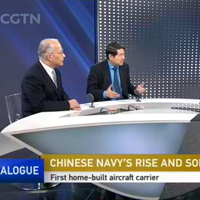
【CGTN Dialogue】Chinese NAVY’s Rise and Soft Power
[Video Watching]Today, media has been dominated by news that China launched its first home-made aircraft carrier, arousing concerns and speculation on China’s military and its naval power. As China’s development is more and more dependent on the sea, China is increasingly concerned about the safety of its sea. The navy now needs not only offshore capabilities, but also operational capability of defense in the ocean. Chinese experts believe more carriers is a symbol of a stronger navy and hope to become a major maritime power. But still, it takes time to form the real capability to achieve the set goal. This newly self-constructed carrier symbolizes that China is getting into a new stage, but that it would not a threat or challenge to the world. Yet this new carrier has indeed raised concerns from other countries about the peace-making nature of China, and it might bring China into an internal conflict between its desire to protect the Chinese people and assets and the non-intervention idea. The construction also raised doubts about how China is going to use the capabilities Building such a carrier is not a demonstration of technology or an intention to match its economic status, but merely a practical choice. As the second largest economy biggest and biggest trading power in the world, it’s necessary for China to develop such capabilities to protect its own resources and assets. However, these efforts been interpreted in other ways by other countries like India. The Dialogue Studio inviting Einar Tangen, an author and colummist, and Dr. Wang Huiyao, a president of Center for China and Globalization(CCG), to sharing their opinions and discussions.From CNTN, April, 2017
2017年5月2日 -
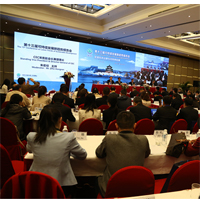
【国际商报】“一带一路”贡献中国智慧
4月20日,中国可持续发展工商理事会(CBCSD)会员大会暨第十三届可持续发展新趋势报告会在北京召开。 报告会聚焦“全球经济治理与可持续发展”,从“全球经济治理背景下的经济可持续与包容性增长”,“落实2030可持续发展议程的工商业行动”,“更好的商业、更好的世界”等三个专题展开。 可持续发展任重道远 2017年,保护主义思潮泛起,不确定性因素加剧,经济、环境、社会的可持续发展面临挑战。中国国家主席习近平在2017年世界经济论坛年后上发表主旨演讲时表示,中国将坚定推动各国合作,促进经济全球化进程向着更有活力、更加包容、更加可持续的方向发展。 对此,中国企业联合会(CEC)会长、第十届全国政协副主席王忠禹表示,面对新的国际国内形势,中国无论从可持续发展角度积极参与全球经济治理,还是从全球经济治理的高度全面推动可持续发展,都具有很强的必要性和现实意义。 王忠禹认为,中国实现可持续发展仍然任重而道远。推动可持续发展,一方面应解决好国内经济社会发展中不平衡、不协调、不可持续等方面的突出问题;另一方面,要放眼全球,用可持续发展的实际行动树立负责任的大国形象,为改善全球治理做出应有的贡献。 为此,他建议企业,一要积极构建面向绿色消费的全球产业链;二要努力将可持续发展贯彻到对外投资建设当中;三要持续深入推进结构调整,采取资产重组、产权转让、关闭破产等方式对过剩产能予以处置;四是主动适应和把握新规则,切实承担起主体责任,在可持续发展中贡献中国智慧,展现中国力量。广大企业应努力加强相关领域的研发积累,在新规则、新规范的变化过程中抢抓主动权。 推动“一带一路”绿色发展 中国正在倡导的“一带一路”,为可持续发展带来了新的机遇。 对此,中国与全球化智库(CCG)理事长,国务院参事王辉耀表示,在新一轮全球化的背景下,多边全球治理的机制正在形成,以中国为代表的新兴经济体正在进一步影响国际经贸格局。在全球治理方面,中国应从五个方面入手,其中包括形成全链条双边自贸区网络,建立“一带一路”国际联盟;加强对“一带一路”多边/双边合作机制体制建设。 王辉耀强调,中国是全球化和加入国际贸易组织(WTO)的受益者,“一带一路”可以成为新全球化治理模式,甚至是一个新的WTO多年机制安排或类似跨太平洋伙伴关系协定(TPP)的安排。考虑建立“一带一路”国际联盟或“一带一路”国际委员会,与沿线国家共同制定“一带一路”的全球治理、区域治理新秩序。在“一带一路”多边/双边合作机制体制建设方面,充分利用现有多边合作机制,创新多边合作方式,继续深化和利用好现有合作平台机制,推进“一带一路”沿线各国务实合作,完善双边合作机制,有效进行重大规划和项目对接。 王忠禹也表示,要推动“一带一路”倡议中坚持贯彻可持续发展战略,用最大的诚意与努力造福沿线各国人民。一方面要坚持理性投资,避免贸然突进,选择有意义、有利润、可持续的投资项目循序渐进,稳步发展;另一方面,要将绿色发展的理念扩展到国际市场,在“一带一路”沿线国家建设绿色工厂、绿色园区等示范项目,加强绿色低碳技术、装备与产业等方面合作,积极履行社会责任和担当,推进沿线国家提高可持续发展水平。文章选自《国际商报》,2017年4月26日
2017年5月2日 -
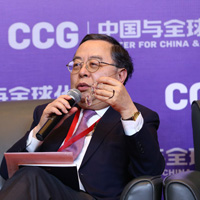
【Global Times】China should be cautious with financial globalization
Ronnie Chan, co-chairman of the Center for China and Globalization (CCG) and chairman of Hang Lung GroupDiscussions about globalization in the Chinese mainland are quite different from those in the US. In the mainland, the discussion basically focuses on the real economy or manufacturing. But big US companies already brought their manufacturing to other countries around the world several decades ago. In the US, the talk about globalization is mainly about finance, but it is rare to hear about financial globalization in China, and the difference is worth thinking about.Talking about innovation, it must be noted that China cannot and should not innovate in financial globalization. China is different from the Western world, which has a lot of capital and has undergone financial globalization gradually with the help of technological development. After the financial "Big Bang" in London in 1986 and the sudden deregulation it brought, deregulation of financial markets became the main trend for the sector, but this brought big problems for the world. The Asian market was not immune, and it suffered significant losses during the 1997 financial crisis. At that time, the West thought China’s regulation was inadequate, but they failed themselves after 10 years of financial globalization.In 2008, financial globalization almost overturned Western economies. So China must be cautious in this respect. The country must take its own path in financial globalization instead of following others. The financial market is growing increasingly bigger, and any serious event could destroy everything. China’s focus is the real economy, while the West cares more about finance, which is why I think China should not innovate in financial globalization. China should partly close its door in the financial arena, but not completely, to the outside world. If China follows countries in terms of financial globalization and completely opens its financial market, it will lead to great damage both for itself and the world. Among the many aspects of globalization, one aspect that is worth more consideration than it gets is research into the adverse impact of scientific and technological progress. Everyone is talking about how good technological innovation is, but few people study the negative impact it brings. It should be pointed out that such studies are not opposed to innovation, science and technology; instead they allow us to have a more comprehensive and clear understanding of globalization.From the perspective of job creation, it is well known that technology has created a lot of industries, but it has also destroyed a lot of jobs, which has already become a problem in the world. For instance, robots are now able to replace workers in a large range of areas. But what will happen if a large number of jobs are taken by technology in China, given that it is such a populous country? How will its 1.3 billion people make a living? These are questions that deserve consideration.I’m not saying that we should not use technology. We should of course develop technology and make good use of it, but the Chinese people should still think carefully about the associated problems it can sometimes bring.The article was compiled based on a speech made by Chen Qizong, co-chairman of the Center for China & Globalization (CCG) Strategic Advisory Board and chairman of Hang Lung Group, at a CCG roundtable forum. bizopinion@globaltimes.com.cnFrom Global Times, 2017-4-17
2017年5月2日 -
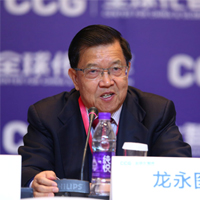
【China Daily】China’s experience in dealing with globalization recommendable
Long Yongtu, Chairman of the Center for China and Globalization (CCG)and former vice minister Ministry of Foreign Trade and Economic Cooperation./ Photo provided to chinadaily.com.cnToday’s economic globalization is driven more by the internet than technology and it’s materialized increasingly by small and medium enterprises than multinational companies and more about the extension of value chain than the relocation of industries, Long Yongtu, former deputy minister of commerce and former Secretary-General of Boao Forum for Asia, concluded at the 3rd China and Globalization Roundtable Forum in Beijing host by a leading think tank, the Center for China and Globalization(CCG) . The following is an excerpt from his speech:The setbacks and challenges especially in US and Europe now the globalization faces are per se the embodiment of the unbalanced redistribution which governments of the all levels in the world should take responsible for.Most Chinese now recognize the positive role of the globalization which indicates the success of the Chinese government in deal with the benefit-sharing. In other words, the experience China got could be recommended to other countries given the current anti-globalization trend worldwide.The benefits globalization should be enjoyed by different social strata and social equity is also a vital attribute in sustaining globalization.The Chinese government has made social equity a priority by carrying out targeted poverty alleviation, narrowing regional gap and improving income redistribution. The recently unveiled Xiongan New Area, a strategy aimed at boosting regional development, is a prime example of this.Not withstanding, it is too early to say that China should lead globalization considering the shortcomings both on science and technology and enterprise competitiveness. China has still a long way to go for such a position.From China Daily, 2017-4-24
2017年5月2日